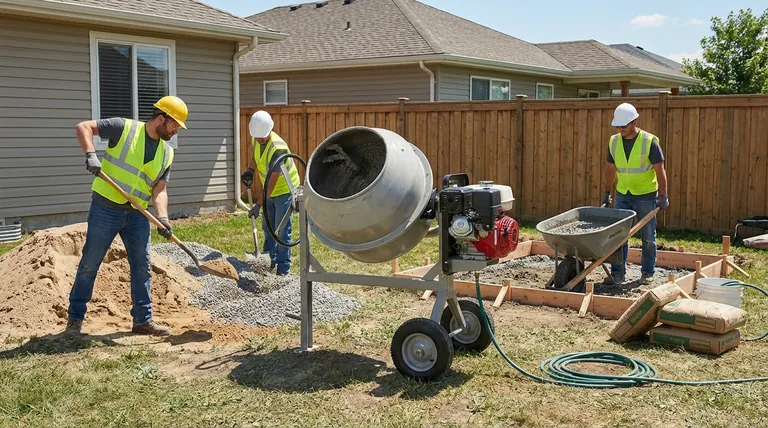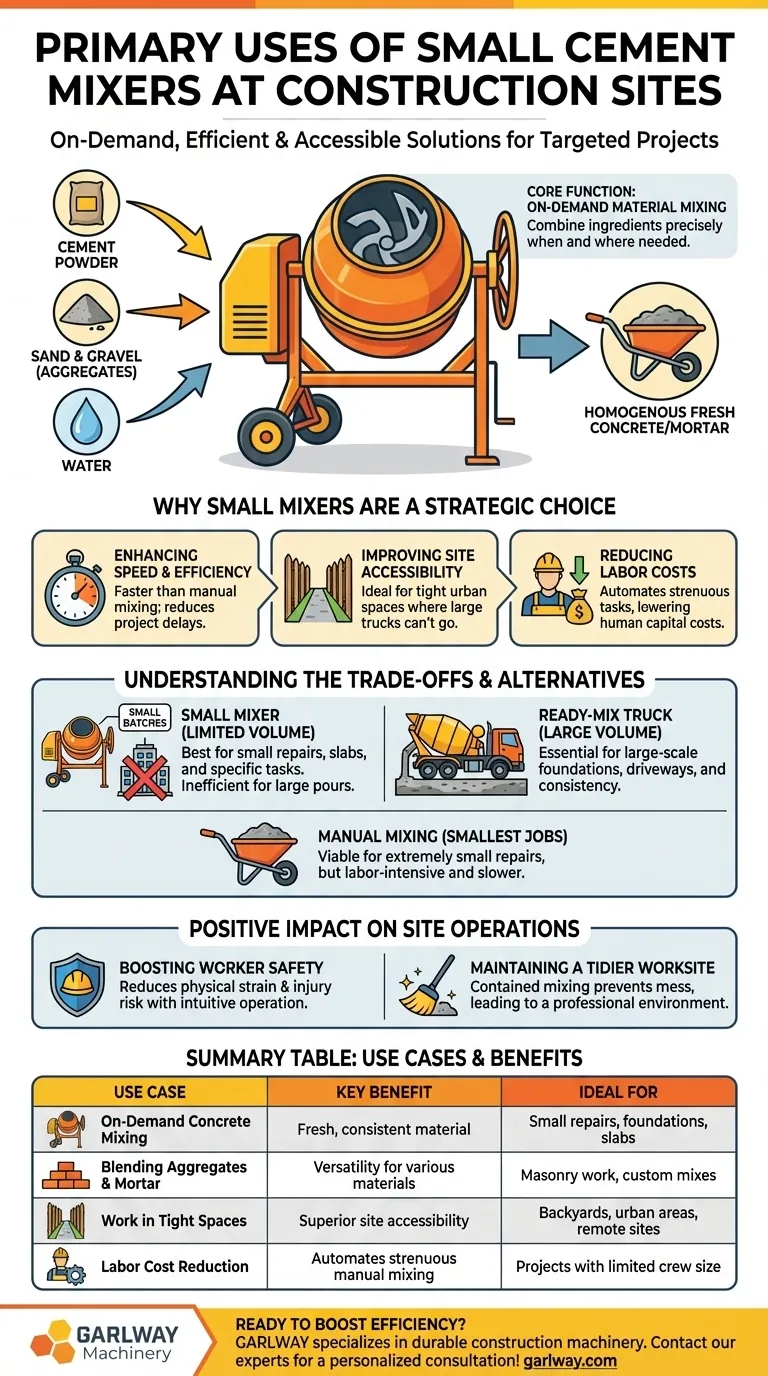At its core, a small cement mixer's primary use is for the on-site mixing of concrete, cement, and various aggregates like sand, gravel, and lime. This capability allows construction crews to produce fresh, workable material precisely when and where it is needed, especially for smaller volume jobs.
The true value of a small cement mixer isn't just in mixing materials; it's in providing a cost-effective, efficient, and highly accessible solution for projects where manual mixing is too slow and a large ready-mix truck is impractical.

The Core Function: On-Demand Material Mixing
A small cement mixer is a versatile tool designed for one fundamental purpose: combining separate ingredients into a homogenous, usable construction material.
Mixing Concrete and Cement
The most common application is mixing cement powder, water, and aggregates to create fresh concrete. This ensures the mix is at the perfect consistency for immediate use in foundations, repairs, or small slabs.
Blending Various Aggregates
Beyond standard concrete, these mixers are also used to combine other materials. This can include blending different grades of sand and gravel or creating lime mortar for masonry work.
Why Small Mixers Are a Strategic Choice
Choosing a small, portable mixer is often a strategic decision driven by the specific constraints and goals of a construction project. It addresses key challenges that larger-scale solutions cannot.
Enhancing Speed and Efficiency
A small mixer significantly speeds up the process compared to mixing by hand in a wheelbarrow. It ensures tasks are completed faster, reducing project delays and eliminating concerns about falling behind schedule.
Improving Site Accessibility
For projects in hard-to-reach areas, such as backyards or tight urban spaces, a portable mixer is invaluable. It brings the mixing capability directly to the point of work, where a large concrete truck could never go.
Reducing Labor Costs
By automating the strenuous task of mixing, these machines reduce the amount of manual labor required. This directly translates to lower human capital costs and frees up workers for other critical tasks.
Understanding the Trade-offs
While highly effective, a small mixer is not the right tool for every situation. Understanding its limitations is key to using it properly.
The Volume Limitation
The most significant trade-off is volume. Small mixers are designed for small batches. Attempting to use one for a large foundation pour would be incredibly inefficient and lead to inconsistencies in the final product.
The Alternative: Manual Mixing
For extremely small repair jobs, mixing by hand in a wheelbarrow or on a tarp can still be a viable, albeit labor-intensive, alternative. It requires no specialized equipment but sacrifices speed and consistency.
When to Call the Ready-Mix Truck
For any project requiring a significant volume of concrete, such as a large slab, driveway, or building foundation, a ready-mix delivery truck is the only practical and professional choice.
The Impact on Site Operations
Integrating a small mixer into the workflow has positive effects that extend beyond simple efficiency.
Boosting Worker Safety
These machines are equipped with safety features and are designed for intuitive operation. They reduce the physical strain and risk of injury associated with manually mixing heavy materials, contributing to a safer work environment.
Maintaining a Tidier Worksite
Using a contained mixer helps prevent the mess of cement powder, sand, and water that often results from manual mixing on the ground. This leads to a more organized and professional-looking construction site.
Making the Right Choice for Your Goal
Selecting your mixing method depends entirely on the scale and location of your work.
- If your primary focus is small repairs or remote areas: A portable mixer is the ideal tool for its on-demand mixing and accessibility.
- If your primary focus is cost-efficiency on smaller projects: A small mixer reduces labor costs and material waste compared to manual mixing or ordering a small batch from a ready-mix plant.
- If your primary focus is a large-volume pour: A ready-mix concrete truck is the only suitable solution for ensuring consistency and speed.
Ultimately, choosing the right tool for the scale of the job is fundamental to running a safe, efficient, and profitable construction project.
Summary Table:
| Use Case | Key Benefit | Ideal For |
|---|---|---|
| On-Demand Concrete Mixing | Fresh, consistent material | Small repairs, foundations, slabs |
| Blending Aggregates & Mortar | Versatility for various materials | Masonry work, custom mixes |
| Work in Tight Spaces | Superior site accessibility | Backyards, urban areas, remote sites |
| Labor Cost Reduction | Automates strenuous manual mixing | Projects with limited crew size |
Ready to boost your project's efficiency with the right equipment? At GARLWAY, we specialize in durable construction machinery, including concrete mixers, winches, and batching plants designed for the needs of construction companies and contractors. Let us help you find the perfect mixer to enhance speed, safety, and cost-effectiveness on your job site.
Contact our experts today for a personalized consultation!
Visual Guide

Related Products
- Commercial Electric Concrete Mixer Machine HZS 50 Small Batch Plant for Sale
- HZS35 Small Cement Concrete Mixing Batch Plant
- Portable Electric Small Cement Mixer Concrete Machine
- JW1000 Mobile Cement Mixer Concrete Mixer Truck and Batching Plant
- Commercial Construction Mixer Machine for Soil Cement Mixing Concrete
People Also Ask
- What is the best chemical to clean a cement mixer with? A Guide to Safe, Effective Cleaning
- What factors should be considered when selecting cement blending equipment? A Guide to Maximizing ROI
- What is a good size concrete mixer for small projects? Find the Perfect 3-5 Cu Ft Mixer for Your Job
- How can cement blending equipment enhance construction project outcomes? Boost Efficiency & Quality
- What is a cement concrete machine called? Discover the Right Mixer for Your Project
- What's the difference between a cement mixer and a mortar mixer? Choose the Right Tool for Your Project
- What health benefits does a small cement mixer provide? Protect Your Back and Lungs on the Job
- What makes small cement mixers easy and convenient to use? Boost Productivity on Any Job Site



















